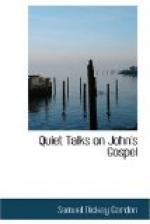It’s a ladder rising from bottom round to topmost. It means to be persuaded that a thing is true; then to place confidence in it, to trust. And trust always contains the idea of risk. The heart-meaning always is that you risk something very precious to you, risk it to the point of heart-breaking disaster if your trust proves wrong.
Our English word is of very close kin. It runs the same sort of sliding scale, from something valuable and precious in itself, on to something that satisfies you regarding the matter in hand. You are not only satisfied but pleased, content. And so there is the same trusting and risking, the same leaning your whole weight upon the thing. Deep down at its root, believe is a close kinsman to love. They both spring out of the same warm creative womb.
When we dig a bit into that word believe in the usage of common life it means three distinct things, each leading straight into the other,—knowledge, belief, trust. That is, facts, facts accepted, facts trusted in regard to something that takes hold of your life. You hear something. You believe it’s true. But there must be the third thing, risking something valuable. There’s no belief in the heart-meaning without this thing of risking. The trust that risks is the life blood of faith. The rest is only the bony skeleton with tendons and sinews and flesh. There’s no life without the blood. There’s no belief without trust.
And the word witness is the same pure-gold sort of nugget, assaying full weight. John’s native word and our own are just the same in meaning. Their meaning is to tell what you know. We shall be running across this word again, and digging a bit deeper into it. But this is the thing that stands out in it. You tell something that you yourself know. There’s personal knowledge. There’s a telling some one else this thing you know. And yet more, there’s the purpose in the telling, that others may know what you know, and get all the good that comes with knowing it.
The witnessing is that others may believe. It is a striking thing in John that the thought of witness is more common than the word. The word occurs several times, and always in a leading way. But the thought of witnessing is the colouring of every page, and the chief colouring.
I said that these two words were twins, born at the same time, of the same mother. That warm-hearted brooding mother is the word wooing. Originally wooing means bending towards, inclining forward or reaching out towards another. And the purpose of the reaching out is to get the other to reach forward towards you. And that purpose puts the warm feel into the reaching out.
All words were pictures first. Here in this word wooing is a picture, by one of the old masters, waiting to be restored, with all the dusty accumulations of the years carefully removed. And here’s the picture: a man standing, with the light of the morning shining in His eyes, body bending forward, hands reaching out, with an eagerness, an expectancy in every line of His body, and tender love glowing out of His face, and sounding in the very tones with which the voice is calling.




